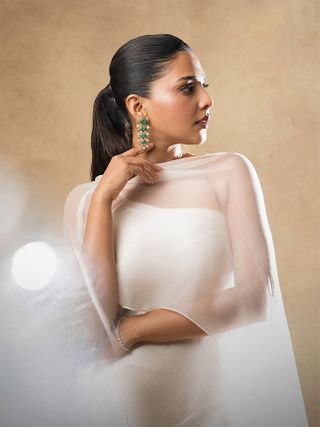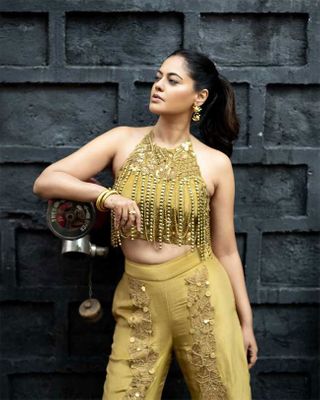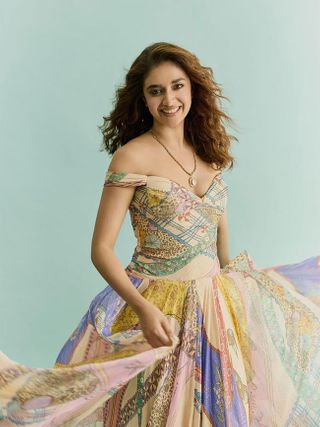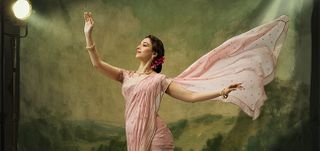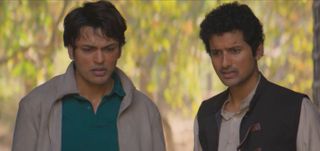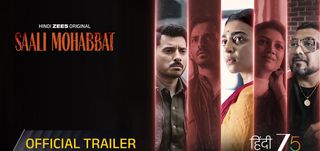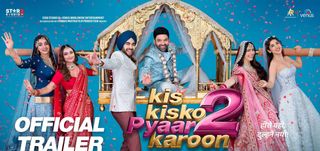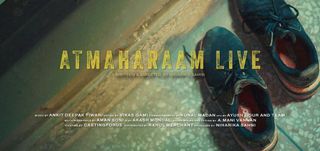The Blue Umbrella Movie Review
There's a quaint wintry feeling to Vishal Bharadwaj's new film that comes not from knowing-it-all about filmmaking (and god knows, after "Maqbool" and "Omkara", he is qualified enough to strut around as a know-all) but from entering the dark tunnel of non-knowing, to explore an uncharted territory and emerge into a light that's illuminating and un-experienced.
This is the spirit in which Bharadwaj in his new film enters the world of the child Biniya, played by Shreya Sharma who is as brilliant as Shweta Prasad was in his other film about the unpredictable fantasy world of the young in "Makdee". "The Blue Umbrella" is about the world of the young but not a film about children at all.
What is "The Blue Umbrella" about - a fragile fable, a deep exploration of the relationship between fantasy and childhood or a treatise on the bonding sometimes bordering on interchangeable between the very young and the very old?
"Blue Umbrella" is all of that, plus a lot more.
The film's delicately perched theme and baby-soft mood, largely brought on by the mellow and cold textures of Dalhousie's hilly climate, are bolstered by some genuinely lucid, near-lyrical photography by Sachin Kumar Krishnan.
To see the little girl romping in the rain-soaked valleys with her newly acquired blue umbrella is a sight reminiscent of images out of Vittorio de Sica or Satyajit Ray's early works.
The director isn't blown away by the visual and lyrical powers bequeathed to him by a team and theme that create a dreamscape out of the muted mellow resources of Ruskin Bond's novella.
Through sharply drawn vignettes and a razor-acute humour, Bharadwaj builds up a gradual momentum in the narration as the umbrella becomes a stalking point between little Biniya and the village crank Nandkishore Khatri (Pankaj Kapur) who covets the girl's umbrella and finally disgraces himself by stealing it.
The frail and tender film's finest moments come towards the end when the old man is ridiculed and ostracised by the village for his ostensibly petty theft.
Pankaj brings a magnificent yet mirthful eloquence to his crabby greedy old man's role. It's hard to imagine "The Blue Umbrella" working without his presence. The actor vanishes into the umbrella-thief's role with the stealth of a well-oiled thief stealing into a room filled with priceless treasures.
And what a booty Pankaj and Bharadwaj emerge with! Don't let the intimate smallness of the presentation lull you into believing this to be minor film.
"The Blue Umbrella" talks of layers upon layer of existential dilemma. It goes into areas of human foibles where the camera generally has no access. We see the old man's startling solitude in the snow-capped landscape with the fearful clarity of life looking at death.
The film's most treasured sequence is the one where the little girl returns to Khatri's deserted tea stall - humours him by buying stuff and then quietly leaves the tell tale umbrella on his counter.
Here, more than anywhere else in the richly tapestried story of hankering and pain, the umbrella, blue or otherwise, emerges as a metaphor for dreams... pursued, found and fugitive.
There's an enigmatic silence enveloping the heart of this peculiar tale, a silence that's as hard to pierce, as it is to define.
But the tone of timelessness is heard all through. You can't miss being under this "Umbrella" without missing out on a vital point on the raison d'etre of cinema.
This film had to be made because the story of the old man, the little girl and the umbrella that bonds them waited to be told by a raconteur who could capture the wispy mood of the plot without losing the gossamer threads that bind human emotions to a much larger truth than visible to the camera's eye.






